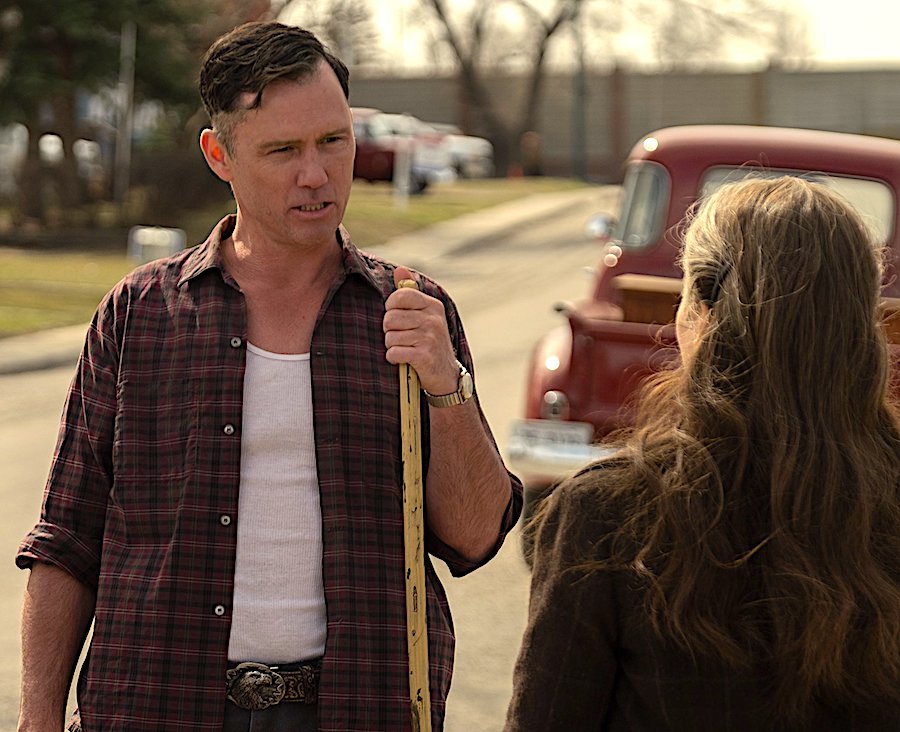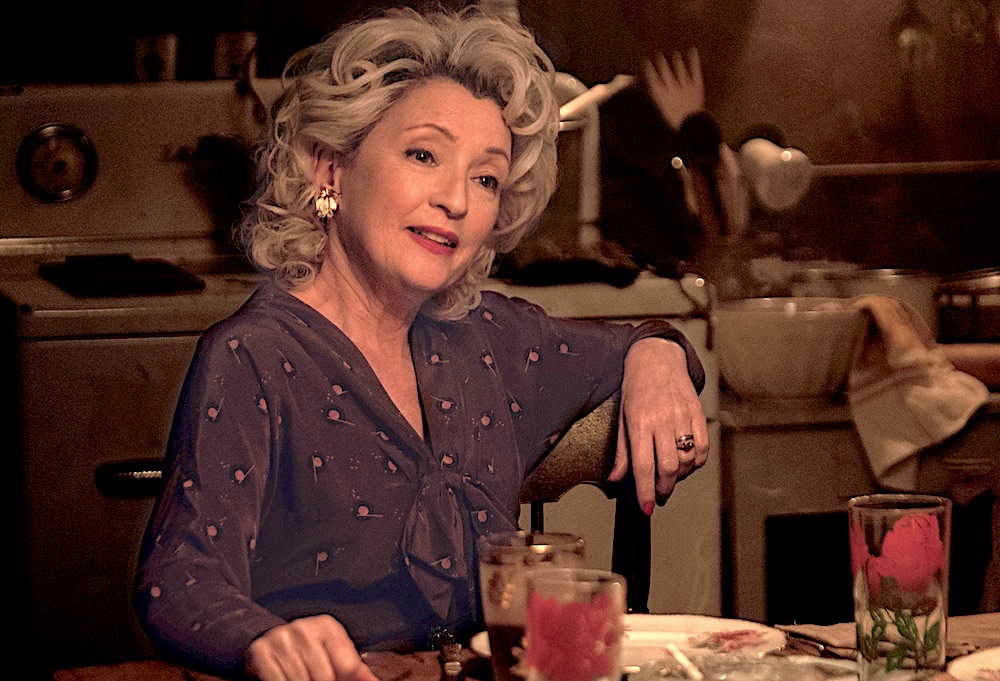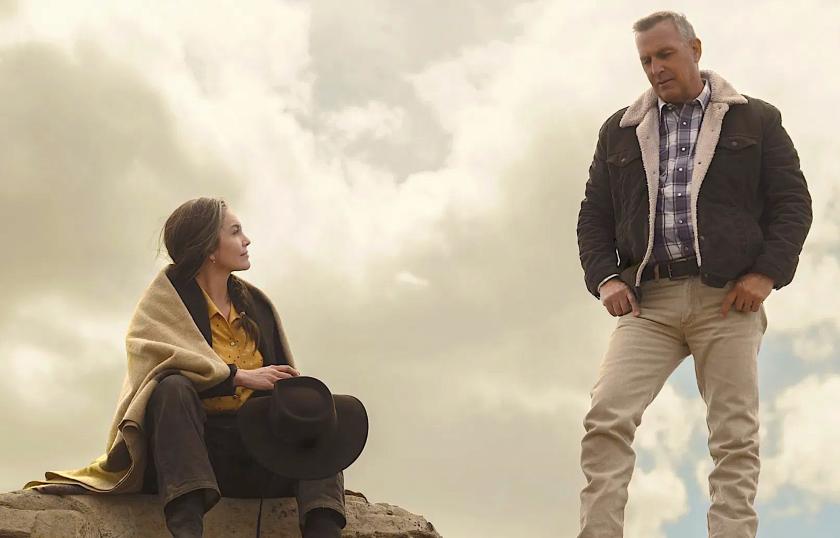The pairing of Kevin Costner and Diane Lane as Superman’s surrogate parents in Man of Steel and Batman v Superman: Dawn of Justice did not go unnoticed, and here writer/director Thomas Bezucha has reunited them as Montana residents George and Margaret Blackledge. He’s a retired sheriff, she’s a former horse-trainer, and now their lives revolve around their son James, his wife Lorna and their baby son Jimmy.
In the early sequences, Let Him Go (adapted from Larry Watson’s novel) looks as though it has a sort of On Golden Pond vibe going on, a sentimental story of growing older, changing generations and the joys and traumas of parenthood. The rugged but beautiful Montana landscape seems to be telling its own story of passing time and the immutable laws of nature, and there’s even a river running through it. Weepy melodrama seems to be looming, signified by the return to the family home one day of James’s horse. Snag is, he’s no longer on it, and when George rides out to investigate his worst fears are confirmed. James has been thrown from the saddle, with fatal consequences.
The shattering of the family unit leaves everyone devastated, and Margaret’s silent sorrow as she stares blankly through the kitchen window while George tiptoes mutely behind her is painful to behold. Yet in theory at least, time is the great healer, though not all that much of it seems to have elapsed when we witness Lorna’s remarriage to Donnie Weboy. But the wedding seems a rather melancholy affair, and the taciturn Donnie (Will Brittain) does not radiate warmth or sociability.
 A darkness seeps into the narrative, and somehow it’s not quite as shocking as it might have been when we learn that the newlyweds have suddenly upped sticks and vanished overnight, headed for Donnie’s family in their North Dakota homeland without leaving a word of explanation. Margaret, who happened to witness an ugly scene of Donnie being violent to both Lorna and young Jimmy in the street, instantly goes into implacable lioness mode, and vows that she’ll go to North Dakota and, somehow, bring back her grandson. She’s lost her son, but she can’t countenance losing Jimmy as well. If George won’t come with her, she declares, she’ll do it alone (he goes, obviously).
A darkness seeps into the narrative, and somehow it’s not quite as shocking as it might have been when we learn that the newlyweds have suddenly upped sticks and vanished overnight, headed for Donnie’s family in their North Dakota homeland without leaving a word of explanation. Margaret, who happened to witness an ugly scene of Donnie being violent to both Lorna and young Jimmy in the street, instantly goes into implacable lioness mode, and vows that she’ll go to North Dakota and, somehow, bring back her grandson. She’s lost her son, but she can’t countenance losing Jimmy as well. If George won’t come with her, she declares, she’ll do it alone (he goes, obviously).
The story unfolds into a quest into the unknown, as the Blackledges journey east through vast expanses of unspoiled landscape. They’re feeling their way, but as they get closer to their destination they’re given more and more hints that Donnie’s Weboy clan is not to be tangled with lightly. What resembled a gentle sunset movie transforms into a maelstrom of horrific family conflict.
It’s a dynastic Western, with strongly-drawn characters sharply etched against the widescreen backdrop. It’s set at the turn of the Sixties, and the period detail of cars, diners, gas stations and cheap motels adds immeasurably to the evocation of a less complicated age when people were defined by their actions and too much talk got in the way. As he’s grown older, Costner has developed a slow and steady stillness reminiscent of some classic Hollywood actors (check out his performance in Hatfields & McCoys for further details), while Lane’s strong and heartfelt work here must rank as some of her best. Still, she gets a run for her money from Lesley Manville (pictured above), startlingly cast as the Weboys’ terrifying matriarch Blanche. With crimson lipstick and Dolly Parton curls, sucking quizzically on a cigarette, she’s a Mommie Dearest nightmare, and her raw back-country accent is like a deadly weapon in its own right. It’s amazing that a British actress was cast in this role, but it’s glaringly obvious why Manville got it, and her stand-off with Lane is at the core of the piece. Among the thuggish Weboy clan, Jeffrey Donovan stands out as Bill (pictured above left), oozing an air of creeping menace.
Still, she gets a run for her money from Lesley Manville (pictured above), startlingly cast as the Weboys’ terrifying matriarch Blanche. With crimson lipstick and Dolly Parton curls, sucking quizzically on a cigarette, she’s a Mommie Dearest nightmare, and her raw back-country accent is like a deadly weapon in its own right. It’s amazing that a British actress was cast in this role, but it’s glaringly obvious why Manville got it, and her stand-off with Lane is at the core of the piece. Among the thuggish Weboy clan, Jeffrey Donovan stands out as Bill (pictured above left), oozing an air of creeping menace.
Quite why the Weboys behave as they do isn’t explored, though Blanche gives a brief account of the family’s generations of death and suffering on their ancestral patch of land. Peter (Booboo Stewart), the wistfully lonely Native American boy the Blackledges befriend along the way, also seems like a character who’s had most of his dramatic function removed in the edit. Overall though, this is a deceptively powerful piece of work boasting more than its fair share of superb performances.















Add comment